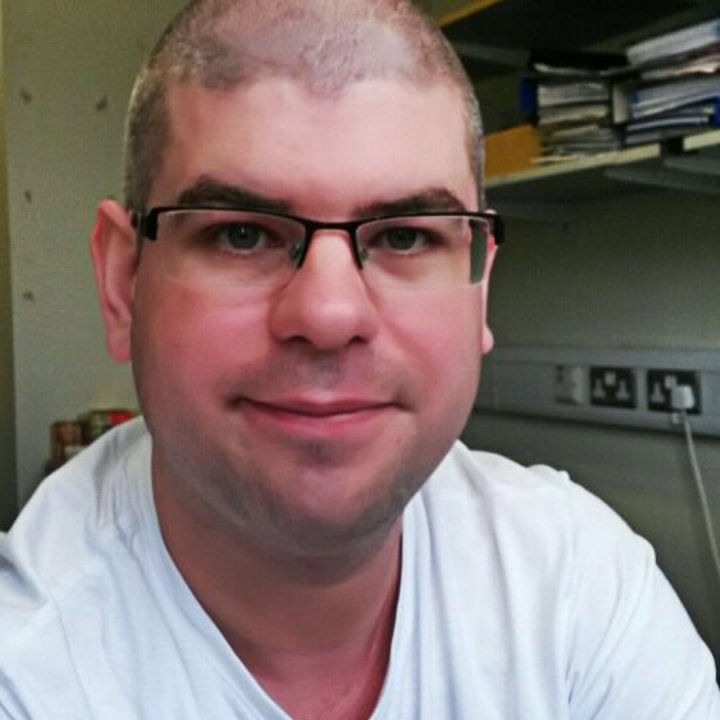
Past Award Winners
Please use the filters below to view the recipients from a specific year
Patrick Cramer
Patrick Cramer

The 2016 Centenary Award was presented to Patrick Cramer from Max Planck Institute for Biophysical Chemistry, Germany. The award is made in recognition of Patrick’s successful systems biology approach to uncovering the importance of and mechanisms in transcriptome surveillance and RNA degradation in the balanced production of mRNAs. Furthermore, two important crystal structures were published in 2013.
Patrick Cramer received his award at the 80th Harden Conference: Machines on Genes IV – Mechanisms of Actions of Large Macromolecular Machines on Genes Across Biological Scales at Shrigley Hall Hotel, Macclesfield, UK, 31 July—4 August 2016.
Read his review article published in Biochemical Society Transactions here: Structure determination of transient transcription complexes.
David Grainger
David Grainger

The 2016 Colworth Medal was awarded to David Grainger (University of Birmingham) for his research relating to the control of bacterial gene expression by factors that act on a genome-wide scale. David is a molecular microbiologist who has made an internationally recognized contribution to the understanding of the control of bacterial gene transcription and chromosome organisation. David has played a major part in establishing the field in which he now excels. David’s high productivity has not come from mining a previously well-established seam, but instead has come from his innovative scientific imagination and a willingness to pursue new techniques and ideas.
David Grainger received his medal at the 80th Harden Conference: Machines on Genes IV on 31 July—4 August 2016 at Shrigley Hall Hotel, Macclesfield, UK.
Anne-Marie Krachler
Anne-Marie Krachler

The 2016 Early Career Research Award for Biological Systems was presented to Anne-Marie Krachler of the University of Birmingham. Anne-Marie is an outstanding young researcher who has a passion for discovery, a determination to provide robust, ground-breaking data and an unquenchable enthusiasm to train the next generation scientists demonstrated through her pioneering the “IMI Summer School”, a week-long training scheme for sixth formers that has received overwhelming acclaim and is now heavily oversubscribed.
Anne-Marie presented her Early Career Research Award lecture at the University of Birmingham, UK on 28 April 2016.
Read Anne-Marie's article published in Biochemical Society Transactions - Against the tide: the role of bacterial adhesion in host colonization.
Bungo Akiyoshi
Bungo Akiyoshi

The 2016 Early Career Research Award for Cells was presented to Bungo Akiyoshi of the University of Oxford. As well as elucidating mechanisms with clear relevance to cancer and organismal homeostasis, Bungo employs trypanosomes as a model system, and his identification of a novel, trypanosome-specific apparatus of chromosome segregation will allow the future development of drugs that may combat parasitic diseases such as African trypanosomiasis (sleeping sickness) in humans, or leishmanaiasis and nagana in livestock animals.
Bungo Akiyoshi was presented with his Early Career Research Award at the Cilia, Cytoskeleton and Cancer on 25-26 April 2016 at IGMM, Edinburgh, UK.
Read Bungo's article published in Biochemical Society Transactions - The unconventional kinetoplastid kinetochore: from discovery toward functional understanding.
Joseph Marsh
Joseph Marsh

The 2016 Early Career Research Award for Computational Biology was presented to Joseph Marsh of MRC HGU, University of Edinburgh for his work in producing an outstanding body of research, addressing diverse aspects of protein structure, dynamics, assembly and evolution using a variety of computational methods, often in combination with experimental data.
Joseph presented his award lecture at the Sanger Institute, Hinxton, UK on 8 November 2016.
Read Joseph's article published in Biochemical Society Transactions - Signalling assemblies: the odds of symmetry.
Anthony Roberts
Anthony Roberts

The 2016 Early Career Research Award for Molecular Structure and Function was presented to Anthony Roberts of Birkbeck, University of London for his work in producing research of the highest international standard focused on the structure and mechanism of cellular motor proteins.
Read Anthony's article published in Biochemical Society Transactions - Emerging mechanisms of dynein transport in the cytoplasm versus the cilium.
Charles Swanton
Charles Swanton

The 2016 GlaxoSmithKline Award was presented to Charles Swanton, of Cancer Research UK’s London Research Institute, for his work on cancer heterogeneity which has had a huge impact in the field with far reaching and important implications to future approaches to cancer therapy.
Charles presented his GlaxoSmithKline award lecture on 17 November 2016 at Charles Darwin House, London, UK.
Read Charle's article published in Biochemical Society Transactions - Constraints in cancer evolution.
John Harwood
John Harwood

The Morton Lecture in 2016 was presented to John Harwood, from Cardiff University. John Harwood has had a long career at the forefront of research into lipid biochemistry. John’s original contributions to lipid biochemistry are many and varied; he has worked in both animal and plant lipid biochemistry, and made important contributions to both. His research has covered all levels of lipid biochemistry, from genes to medical products.
John presented his lecture in Cardiff on 10 November 2016.
Read John's article published in Biochemical Society Transactions - Inspired by lipids: the Morton Lecture Award Presentation.
Michael Murphy
Michael Murphy

The Keilin Memorial Lecture in 2016 was presented to Michael Murphy (MRC MBU, Cambridge, UK) for his contribution to research in basic and applied bioenergetics. Michael has produced influential discoveries in the last 20 years showing the detailed mechanisms of mitochondrial oxidant production and has pioneered translational redox bioenergetics.
Michael Murphy gave his award lecture at the 79th Harden Conference: Oxygen Evolution and Reduction – Common Principles, Grauer Bär, Innsbruck, Austria, 16—20 April 2016.
Read Michael's article published in Biochemical Society Transactions - Understanding and preventing mitochondrial oxidative damage.
Carol Robinson
Carol Robinson

The 2016 AstraZeneca Award was awarded to Dame Carol Robinson from the University of Oxford. Carol is a UK-based biochemist whose research has made a very significant contribution to the development of mass-spectrometry techniques for the analysis of biologically important complexes.
Read Carol's article published in Biochemical Society Transactions - From molecular chaperones to membrane motors: through the lens of a mass spectrometrist.
Carol Robinson presented her award lecture at Charles Darwin House, London on 17 October 2016.
David Tollervey
David Tollervey

